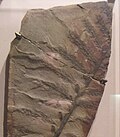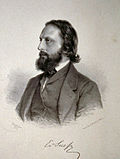co-preserved Glossopteris leaves, probably belonged to non-glossopterid groups, such as voltzialean conifers. The distribution of Glossopteris across several...
31 KB (3,427 words) - 20:16, 4 October 2024
Ohio Range (redirect from Mount Glossopteris)
of stratified rocks. Later a tractor train visited the base of Mount Glossopteris, where four of the party climbed the mountain and collected samples of...
17 KB (2,778 words) - 15:23, 31 October 2024
Radok Lake (redirect from Glossopteris Gully)
(Pagodroma nivea) which nest in the weathered sandstone walls of the gorge. Glossopteris Gully (70°51′S 68°6′E / 70.850°S 68.100°E / -70.850; 68.100) is a...
8 KB (735 words) - 13:10, 8 October 2024
Triassic records of the group have been recorded. The best known genus is Glossopteris, a leaf form genus. Other examples are Gangamopteris, Glossotheca, and...
4 KB (274 words) - 22:17, 15 October 2024
group of seed plants with no close living relatives), most prominently Glossopteris, a tree interpreted as growing in waterlogged soils, which formed extensive...
145 KB (15,709 words) - 20:51, 31 October 2024
Rio Bonito Formation (section Glossopteris flora)
the second-order stratigraphic supersequence called Gondwana I. The Glossopteris flora is characteristic of fossil sequences of the Gondwana supercontinent;...
5 KB (440 words) - 16:41, 17 July 2023
Antarctic fossils discovered. The fossils were determined to be from the Glossopteris tree and proved that Antarctica was once forested and joined to other...
61 KB (8,078 words) - 23:03, 15 November 2024
forests dominated by seed ferns were prevalent in the late Paleozoic. Glossopteris was the most prominent tree genus in the ancient southern supercontinent...
15 KB (1,368 words) - 21:57, 28 June 2024
Archaeopteris Carboniferous Evolutionary history of plants Fossil Grove Glossopteris Lepidodendrales Lycophytes Lycopsid Stigmaria Sigillaria V. V. Alekhin...
19 KB (2,039 words) - 18:54, 3 October 2024
groups. The southern continent saw extensive seed fern forests of the Glossopteris flora. Oxygen levels were probably high there. The ginkgos and cycads...
116 KB (11,953 words) - 22:40, 15 November 2024
of their previous contiguous nature also came from the fossil plants Glossopteris and Gangamopteris, and the therapsid or mammal-like reptile Lystrosaurus...
113 KB (14,111 words) - 09:16, 11 November 2024
found in South Africa, India and Antarctica, alongside members of the Glossopteris flora, whose distribution would have ranged from the polar circle to...
39 KB (4,687 words) - 23:46, 23 October 2024
Immediately above the Permian–Triassic boundary the glossopteris flora was suddenly largely displaced by an Australia-wide coniferous flora....
71 KB (7,725 words) - 08:11, 12 November 2024
branch or group of branches) surrounded the ovule (e.g. Caytonia or Glossopteris). Ovule orientation may be anatropous, such that when inverted the micropyle...
15 KB (1,935 words) - 11:09, 7 November 2024
extended the range of the Taxales into Gondwanaland. He also described Glossopteris in detail and identified differences between the flora of India and Australia...
20 KB (2,668 words) - 11:18, 22 October 2024
lycophytes, conifers and seeds. These include Gangamopteris, Euryphyllum, Glossopteris, and Samaropsis, The formation also preserves arthropods, including insects...
13 KB (1,200 words) - 05:20, 29 April 2024
compression fossils of elongate multiovulate reproductive structures adnate to Glossopteris leaves. Permineralized remains identical to Dictyopteridium have been...
4 KB (263 words) - 13:03, 9 January 2024
Within the tuff of this formation, west facing, fossilized remnants of Glossopteris trees can be seen in the wave cut platform. Reids Mistake Formation consists...
3 KB (154 words) - 00:30, 7 May 2024
It generally refers to reproductive organs, which are associated with Glossopteris leaves. Retallack, G.J.; Dilcher, D.L. (1988). "Reconstructions of selected...
2 KB (94 words) - 13:08, 9 January 2024
Gangamopteris is a genus of Carboniferous-Permian plants, very similar to Glossopteris. Previously, it was classified as fern with reproduction by seed. The...
3 KB (245 words) - 18:04, 17 May 2024
parts of the Indian Subcontinent. This area was full of forests that had Glossopteris and Dadoxylon conifer trees with the co-existing giant Sauropods approximately...
4 KB (411 words) - 20:34, 8 August 2024
beginning of the Carboniferous period. Paleontology portal Calamites Glossopteris Lyginopteris Fossilized Roots Are Revealing the Nature of 385-Million-Year-Old...
12 KB (1,221 words) - 00:12, 5 October 2024
area, 150 million years before the break-up of Pangea. The abundance of Glossopteris and Mesosaurus fossils are characteristic of the Gondwanan correlation...
13 KB (1,153 words) - 21:30, 8 July 2024
Dinogorgon Dwykaselachus Endothiodon Eunotosaurus Galechirus Glanosuchus Glossopteris Hofmeyria Ictidognathus Ictidosuchoides Lepidodendron Lycosuchus Mesosaurus...
31 KB (3,660 words) - 23:32, 5 September 2024
Cordaites (gymnosperms) and Glossopteris (seed ferns). The severity of plant extinction has been disputed. The Glossopteris-dominated flora that characterised...
379 KB (40,603 words) - 16:08, 6 November 2024
correlateable from one continent to another. His theory was based upon glossopteris fern fossils occurring in South America, Africa, and India. His explanation...
12 KB (1,170 words) - 13:02, 18 September 2024
L. maccaigi may have forced it to rely on the larger members of the Glossopteris flora, which did not survive the end-Permian extinction. Only the 1.5 m...
27 KB (2,860 words) - 10:08, 19 October 2024
be found in the fossil record. Glossopteris is an extinct species of seed fern plants from the Permian. Glossopteris appears in the fossil record around...
245 KB (27,658 words) - 17:28, 17 October 2024
Dinogorgon Dwykaselachus Endothiodon Eunotosaurus Galechirus Glanosuchus Glossopteris Hofmeyria Ictidognathus Ictidosuchoides Lepidodendron Lycosuchus Mesosaurus...
17 KB (1,840 words) - 22:01, 11 October 2024
on Glossopteris leaves from South Africa’, Trans Geol Soc S Afr, 55 (1952), 281–328 E. P. Plumstead, ‘Bisexual fructifications borne on Glossopteris leaves...
12 KB (1,428 words) - 15:18, 11 July 2024





















